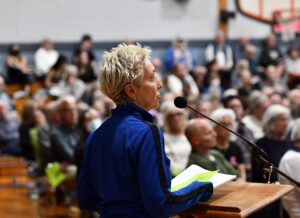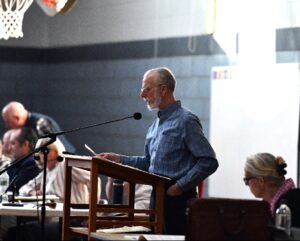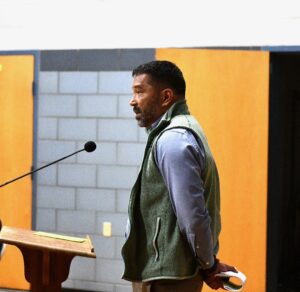WELLFLEET — The 328 voters at the April 28 annual town meeting owed their first unexpected vote to resident Brian Stern, who moved to block a $225,000 capital budget item for affordable housing site development at Maurice’s Campground by making it contingent on passage of Article 26, which would be a step toward development and which he said he opposed.

His proposal was roundly defeated.
Housing advocates were evidently prepared to make their case. As voters entered the elementary school gym for the meeting’s 6 p.m. start, members of the housing authority blanketed the entrance with ushers handing out flyers, cheerfully promoting their cause.
That early vote signaled a trend that continued through the evening: as the meeting worked through the 52-page warrant booklet, 10 articles directly related to affordable housing sailed to approval. In fact, 36 of the 37 articles on the warrant were approved, including the $125,000 in Article 26 to pay for consultants to put together a request for proposals for affordable housing at the campground the town bought for that purpose three years ago.
The sole exception was Article 30, a petition directing the town to dedicate 80 percent of its rooms tax revenue to the affordable housing trust. That article was defeated narrowly in the only counted vote of the evening, with 90 votes in favor and 101 against.

Voters approved two other petitioned articles: Article 31, to amend the town’s charter to give the select board the authority to remove committee members (only for cause, and by “supermajority,” that is, with at least four of five members voting to do so); and Article 32, acceptance of the state’s “seasonal communities” designation, which passed with only about a dozen votes in opposition.
Aside from the Maurice’s amendment that Stern proposed, the town’s operating and capital budgets — Articles 1 and 3 — passed without controversy. They required no Proposition 2½ overrides (those allow towns to raise property taxes above the annual levy limit, which is capped at 2.5 percent).
Select board chair John Wolf warned Independent reporters before the meeting on Monday to expect contentious discussion on Article 6, a one-year Prop 2½ capital expenditure exemption for marina infrastructure. “This goes to Wellfleet’s long, long history of neglect,” he said of the marina’s need for repairs.
But voters gave near-unanimous approval to spend $600,000 to fix the marina’s floats, ladders, and electrical systems — repairs unrelated to the recent fire.
Select board member Ryan Curley spoke in favor of Article 12, which designates the select board as the town’s sewer commissioners. Curley told voters that the designation, which will also appear as a ballot question, was necessary to jumpstart wastewater management at the affordable housing development at 95 Lawrence Road, which he called “our chance to pilot a sewer system on a small scale, so we don’t make larger mistakes later.”

Curt Felix called the article a “catastrophic mistake” and moved to indefinitely postpone it. “We need expertise in these commissioners,” he said. “The board of selectmen is not an expert body. It doesn’t have the time to deal with this issue.”
Select board vice chair Michael DeVasto argued that Provincetown’s select board acted as its sewer commissioners and said the practice was common. The motion to postpone failed, and the article was passed with opposition from about two dozen voters.

Voters quickly approved the town’s remaining financial articles, and Town Moderator Dan Silverman proposed combining Community Preservation Act articles 17 to 25 and 28 and 29. “I know that there are people who want to talk specifically about Article 26,” he added, and Wolf moved to discuss that article separately.
Forward Motion on Maurice’s
For many voters, the evening’s main attraction was Article 26, which asked for $125,000 to hire consultants to help write a request for proposals from affordable housing developers for Maurice’s Campground. The article was approved with a clear majority, but only after generating more than an hour of debate.
The campground, which is used by hundreds of seasonal workers, was purchased by the town in 2022 as a site for affordable housing, and the project’s planning committee earlier this month presented a master plan envisioning about 250 units there.
Advocates presented the article as the next stage of an effort to address the region’s housing crisis. Planning committee member Janis Plaue addressed the idea of waiting for further study, which had been suggested by some during discussion on the master plan. She said that should the article be delayed, costs would only increase. “We just can’t afford to give up this money,” she said.
Stephen Greenberg, a council on aging advisory committee member, agreed, saying, “The fastest way to kill a project is to study it to death.”
Joshua Wagner moved to amend the article to add that an affordable housing deed restriction “be clearly outlined in any future RFP written.”
That detail had already been endorsed by town voters with the campground’s purchase in September 2022, said DeVasto, and therefore the amendment was unnecessary. Nonetheless, Wagner’s amendment passed.
Debate turned back to the main question. “I’m a direct abutter, and I am proud to say that Maurice’s Campground is in my back yard,” said Karen Stern, who with her husband, Brian, has objected to the planning committee’s work so far. She said that she spoke for “a large group from our community” who were “against the proposed density and the overall environmental changes that will happen to the 21 acres” should the RFP funding be approved.
Lauren Arcomano also spoke against the article, saying she thought the development would create demand for fresh water that would threaten the town’s supply.
Will Barrio opposed the article because he felt the master plan did not sufficiently address the need for home ownership in town.
Ennie McDonald, a mother of two, offered a different objection. “A lot of families aren’t here not because they can’t afford housing but because they don’t have a good enough job to pay to live here.”

Several speakers urging townspeople to vote yes on the article said they had witnessed the effects of housing insecurity firsthand.
“I’ve been in this position for 18 years,” said Wellfleet Elementary School nurse Claudia Cope-Crosen, “and worked with many families who have been desperate for housing. Sometimes they share rooms with a parent, or put too many kids in the bedroom, or bounce from one school to the next to the next. It’s painful to watch families give up hope and leave our communities.”
“I recently thought to myself, Wellfleet or Wealth-fleet?” said Kevin Rice, director of the Payomet Performing Arts Center. He said that the number of local families getting involved at the Wellfleet Harbor Actors Theater, which he co-founded, had diminished to a trickle. Failing to act on the article would “cost us a lot more in the future, in more ways than just money and taxes,” he said.

“Turnover at Outer Cape Health Services in Wellfleet is 12 percent higher than in Provincetown or Harwich Port, and a big piece of that is the price of housing,” said Leo Blandford, a clinical social worker. “I am a proponent for as much housing as we can get.”
After 22 speakers had opined on the article, Silverman allowed a motion calling for the vote. The article passed with approval from over three-quarters of those in the room.
Petitioned Articles
Many voters left the gym after the Article 26 vote. The remainder voted to approve Article 27, which designates $250,000 in Community Preservation Act funds for a full-time housing coordinator, and moved on to consider the petitioned articles.
Skeptics of the rooms tax petition worried about its effect on the town’s still-shaky finances, even as they supported the idea of earmarking the revenue for housing. Still, “taking 80 percent of that money out of the general budget will put the town, in my opinion, in a place so tight that we start falling backward again,” Town Administrator Tom Guerino said. The narrowly rejected petition also divided the select board, with DeVasto and Curley in favor and Wolf, Barbara Carboni, and Sheila Lyons opposed.
Several voters spoke in favor of Article 32 to adopt the seasonal communities designation, among them Helen Miranda Wilson, who said she hoped the designation could expand preferential housing options for municipal workers and artists to other groups like commercial shellfishermen.
The select board had held a short public meeting just before the town meeting began in order to consider the question for a second time. After having split on the article earlier, this time they voted 5-0 to recommend it. The re-vote was something Carboni said she had requested after attending a workshop on the designation.
“You know, this is a crisis,” she said. “So, I changed my vote, and I hope that you will support this as well.” Article 32 passed overwhelmingly in the final major vote of the night.



